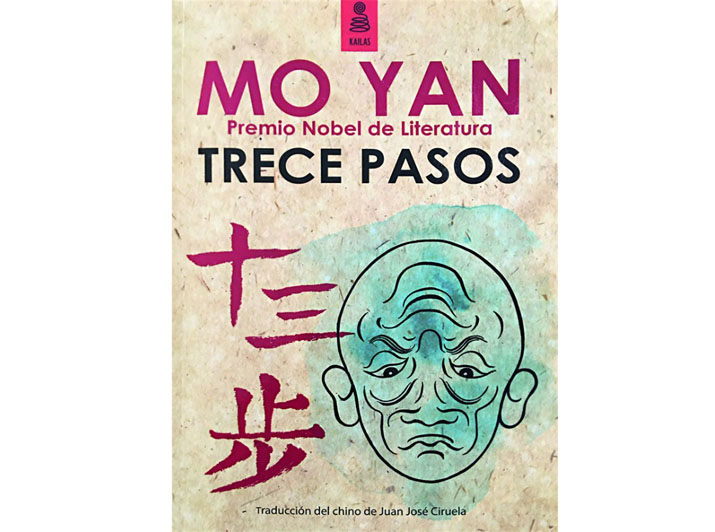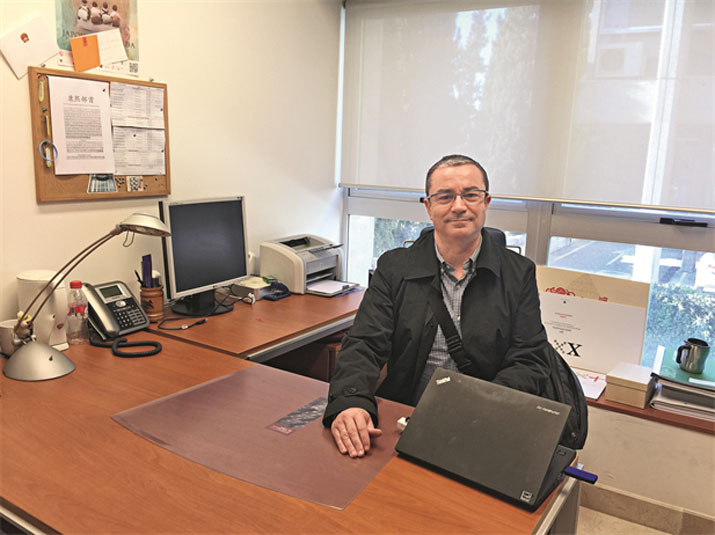Direct translation from Chinese
Ciruela says translating the novel was an interesting challenge. After Mo received the Nobel Prize, many of his works were introduced to Spain. However, as most of them had been translated first into English and then from that language into Spanish, much of the original nuance was lost. For this reason, when the Spanish publishing house Kailas contacted Ciruela to translate Thirteen Steps directly from Chinese, he accepted the mission immediately. Ciruela wanted to make a small contribution to the dissemination of modern Chinese literature, even if it presented difficulties like a heavy workload within a short time limit.
Thirteen Steps is a novel that uses the art of the absurd to describe the situation of intellectuals and social life in China in the 1980s. It takes on an unrealistic tone, mixed with an atmosphere of magic, exaggeration and soliloquy. For Ciruela, the translation process was not always smooth sailing.
"I encountered various difficulties, especially at the beginning of the task," said the translator in an interview with China Hoy, a Spanish monthly published by CICG Americas. "This novel, in particular, needs a prior reading process in which the translator gets into the plot and the characters, since at first it is difficult to enter the world that the novel constantly raises. So I read the novel first in Chinese, paying attention to all those details and how all of that could be translated in a way that the Spanish readers would understand."
For Ciruela, the most important criterion when translating is fidelity to the original text. While it is true that one cannot always be strictly faithful, he believes translators should not stray too far from original texts. For example, the translation of culturemes (expressions of culture in language) is quite complicated due to the cultural gap between Spanish and Chinese. Ciruela believes that these must always be appropriate to the specific function they perform within the text, in each specific case and moment.

Cover of the Spanish version of the novel Thirteen Steps by Mo Yan (COURTESY PHOTO)
Closer ties with China
Ciruela's interest in Chinese arose when he began to study martial arts as a university student. After his initial contact with that part of the Chinese culture, he decided to study the language in order to better understand the culture and be able to communicate. "Over time, the study of Chinese completely fascinated me and became a very important part of my education," he said.
When he finished his university studies, he decided to continue learning the language in China and was able to do so thanks to a scholarship from the Spanish Government.
"I went to China in 1987. In those years, Beijing was a very different city than it is today," he recalled. "I traveled with a colleague, Juanjo Ibáñez, who was going to study traditional Chinese medicine. They picked us up at the airport and took us to the Beijing Language Institute (the current Beijing Language and Culture University). I remember crossing the city from the airport along wide avenues with barely any cars, with many bicycles moving through the streets; also the first days at the Beijing Language Institute, the first Chinese classes, the first foreign friends. In short, every day we discovered something new and everything was exciting and novel."
In 1990, Ciruela took the exam at the Spanish Embassy in China and obtained the first position as an official Chinese translator and interpreter, a position he held until 2002. Just a few weeks after taking the position, he was commissioned to be an interpreter at the meeting between the then Spanish Ambassador Eugenio Bregolat and the then Chinese Foreign Minister Qian Qichen. Later, in 1993, when Felipe González, at that time the president of Spain, visited China, Ciruela accompanied him in his meetings with the Chinese leaders.
Greater interest
In 2002, Ciruela returned to Spain and began teaching Chinese at the University of Granada.
Among Spaniards, he points out, there is a greater interest in the Chinese language and in China. "China is much more present today than it was 20 years ago. Today there are thousands of Spanish students of the Chinese language and dozens of centers where you can learn Chinese, inside and outside the university," he said. "This also poses important challenges because students are increasingly prepared and eager to go to China to continue studying."
In the last decade, more and more Spanish publishers have dedicated themselves into the publication of Chinese books, thus contributing to the cultural exchange between the two countries. "The effort made by some Spanish publishers to publish Chinese books is highly commendable," Ciruela said. "The more it is translated and the better it is translated, the more mutual understanding we will have of our two cultures."
Besides following the exchange in the field of literature, where many efforts are being made to translate in both directions, Ciruela suggests the publication of other types of books that help to better understand China and its complex reality. "In my opinion, it is necessary to have more studies of all kinds on China so that the Spanish reading public can also be informed and better understand the Chinese reality. I think in this way some misunderstandings that still persist in our view of China could be avoided," he pointed out. "All exchange translates into wealth."
For now, Ciruela does not have a translation project, although he is open to receiving any orders on the matter. In fact, he has just finished translating the Cha Jing (The Classic of Tea) , written by Lu Yu, known as the Sage of Tea, during the Tang Dynasty (618-907), which is known as the most comprehensive tea encyclopedia in China and most likely the world. "I hope it will be published in the coming months," he said.















